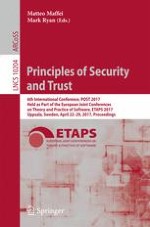2017 | OriginalPaper | Buchkapitel
A Survey of Attacks on Ethereum Smart Contracts (SoK)
verfasst von : Nicola Atzei, Massimo Bartoletti, Tiziana Cimoli
Erschienen in: Principles of Security and Trust
Verlag: Springer Berlin Heidelberg
Aktivieren Sie unsere intelligente Suche, um passende Fachinhalte oder Patente zu finden.
Wählen Sie Textabschnitte aus um mit Künstlicher Intelligenz passenden Patente zu finden. powered by
Markieren Sie Textabschnitte, um KI-gestützt weitere passende Inhalte zu finden. powered by
